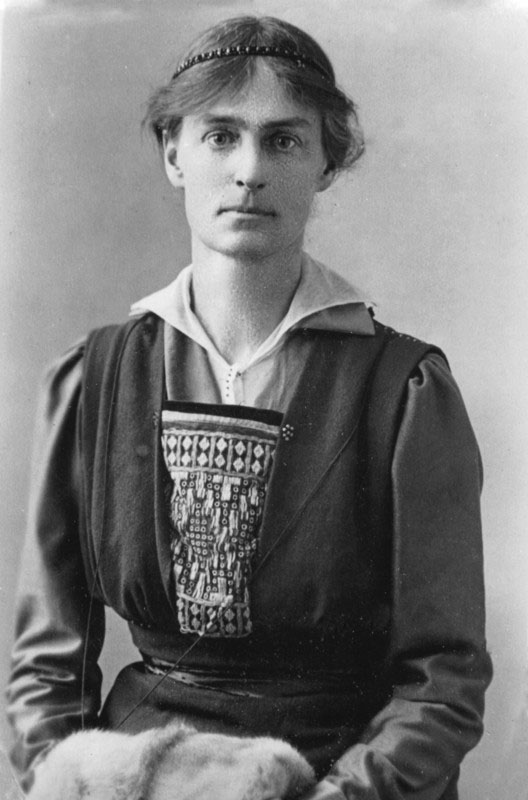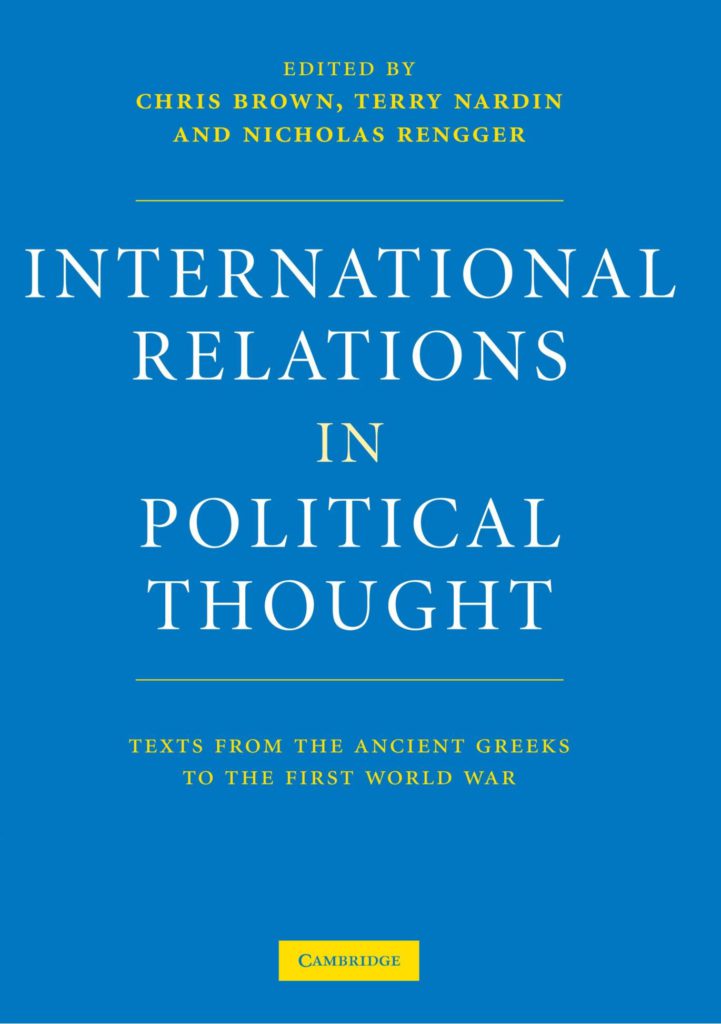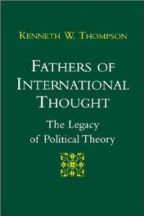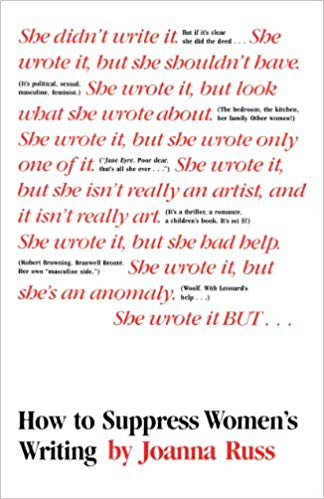by Professor Patricia Owens
How and why are women absent from IR’s canon of so-called ‘intellectual greats’? Here I’d like to share some preliminary answers to this question, drawing on work with Kim Hutchings on canonical women international thinkers.
The intellectual identity and respectability of humanities and social science disciplines is formed through the creation of a canon of intellectual ‘greats’ and foundational texts. One of the earliest such works in the history of international thought was published in 1929 by a Cambridge-trained classicist.
The Growth of International Thought surveyed the development of ‘progressive internationalism’ from the ancient Greeks to the League of Nations through an analysis of figures such as Aristotle, Dante, Machiavelli, Luther, Grotius, Rousseau, Burke, Kant, and Mazzini.
Though its author was not seeking to establish a new academic discipline but popularize liberal internationalist ideas (Sluga 2020), the approach of surveying canonical thinkers was later adapted and extended in the numerous studies of important thinkers by those seeking to establish a discipline of IR from the early 1950s (Morgenthau and Thompson 1950; Wolfers and Martin 1956).
Largely for pedagogical purposes, hundreds of exalted thinkers and their main works have been collected in anthologies and analyzed in edited volumes forming the intellectual basis of the many eponymous schools of IR theory: Hobbesian, Lockean, Machiavellian, Kantian, Grotian, Marxist, Weberian, Gramscian and Foucaudian.
The author of The Growth of International Thought, the first of this genre, was not Alfred Zimmern, Gilbert Murray, Arnold Toynbee, or G. Lowes Dickinson, all well-known classical scholars in IR’s intellectual history.

It was F. Melian Stawell (1929), a figure unknown to later generations of IR scholars but who inaugurated a genre – surveys of ‘men of large and capacious thought’ (Thompson 1980: ix) – from which she and numerous other women intellectuals were effectively barred.

A recent study of eighteen surveys of canonical international thinkers working before the late twentieth-century, including several hundred cumulative references, there were nine to women.
In these works, which includes Stawell’s text, only six women receive some recognition as significant thinkers on international relations: Susan Strange, Hannah Arendt, Simone de Beauvoir, Margaret Mead, Susan Sontag, and Virginia Woolf. This does not include a very brief reference in Stawell’s book to the biblical figure of Ruth, with Ruth is taken to foreshadow a liberal internationalist ‘charm of foreign culture’ (1929: 31).
Why are women absent from IR’s canon of ‘serious thinkers’ (Luard 1992: xiii)? On what basis, with what stated criteria, do authors and editors select these thinkers and texts? Examining the rationale for selection in the twenty-two such works, the most commonly cited criteria are influence, comprehensiveness, representativeness, quality, and recurrent themes.
Generations of authors and editors have interpreted these criteria to effectively exclude women from IR’s canon.
The most commonly cited criteria – influence – is construed in the narrowest of terms: prioritizing the influence of white men on other white men.
There are many explanations for why some thinkers appear to be influential to a variety of different audiences and at any given time. However, there is surprisingly little, if any, elaboration of what influence means in IR’s canon. There is no discussion of the means through which influence is felt and on whom, or the temporality and politics of influence. Appeals to influence in surveys of IR’s intellectual canon appear vague and, with one notable exception, avoid the basic question of why some thinkers ‘enjoy successive revivals of interest’ in particular contexts while others do not (Thompson 1980: x).
In the one volume that did offer an additional elucidation, ‘canonical status represents a judgement about the quality of… thought’ (Brown et. al. 2002: 3, emphasis). Influence is a proxy for excellence.

On this basis, Brown, Nardin, and Rengger sought to explain why there were no women among their fifty thinkers; the only explicit attempt to justify women’s exclusion from IR’s canon identified in our survey. In their words,
Because the relevant criteria can change on the basis of current fashions… the fact that all the writers… are white male Europeans might, or might not, be regarded a legitimate criticism. Nonetheless, …[s]ome thinkers clearly have produced more significant work than others and it seems right that this should be recognized in an informal way, always assuming that the canon is never fixed once and for all, and is always open to revision in the way that… in recent years …the names of Wollstonecraft and Nietzsche have been added (2002: 3).
Women were excluded from the largest collection of international political thought then available because they wrote nothing of significance to the history of international thought. Women’s thought is not significant or influential because it lacks quality.
This assumption is wrong.
Not only does it yield an overlapping and predictable list of ‘great’ male thinkers made influential by repetition. It sustains IR’s continued ignorance of women’s international thought, either by denying its existence or denigrating its substance. Significance and influence are a product of the way in which authors and texts are taught and read as much as if not more than the character and quality of the authors and texts themselves.
Canonical status is not a product of a neutral application of the stated selection criteria, but of the gendered and raced politics of expectations surrounding intellectual greatness and influence.
Valuations of influence and intellectual quality, who counts as a serious thinker, is intimately connected to questions of gender and race.
Our findings confirm the feminist historiography in other fields: historical women’s exclusion from disciplinary canons is always more than accidental; it is constitutive (Smith and Carroll 2000). This literature also suggests a variety of responses to the gendered and racialized formation of IR’s canon, ranging from exposing the processes through which diverse historical women were marginalized (Weiss 2009); recovering and analyzing women’s thought (Broad and Green 2009); and reconstituting the disciplinary canon itself (Pollock 1999).
Birthed by Florence Melian Stawell’s The Growth of International Thought, the existing study of canonical thinkers in IR is the study of the passage of ideas between fathers and sons, brothers, male friends and rivals. Like Political Theory, IR’s existing canon accounts only for ‘constitutive relations of descent and influence between men’ (Nye, 1994: xiv).

Typified in Thompson’s (1994) Fathers of International Thought, the obsession with the eponymous schools – Hobbesian, Lockean, Kantian – is openly patrilineal. IR’s ‘great debates’, to extend Carroll’s analysis, are ‘fratricidal struggles… between loyal sons and followers’ battling to ‘inherit and sustain the privileges and ruling power of the fathers’ (1990: 138, 150). If influence is proxy for quality and based on descent through a white male line, then women and non-white men can never legitimately enter the canon of IR’s intellectual greats.
This is confirmed, rather than contradicted, by the six historical women who have made it into IR’s canon: Arendt, Woolf, Sontag, Mead, Strange, and de Beauvoir. All European or North American, White or Ashkenazi Jewish, they appear as either anomalous and extraordinary, feminist, or inventors of their own field.
As Joanna Russ observed in a different context, these ‘women burst into the official canon as if from nowhere – eccentric, peculiar, with techniques that look odd and preoccupations that don’t “fit”’ (1983: 122).

To prioritize the descent of ideas through a white male line produces an inaccurate, incomplete and distorted account of IR’s intellectual heritage. Women have been excluded on false grounds. The interpretation of the stated criteria is not neutral but deeply gendered and racialized.
The result is that both the exceptional and mediocre work of white males is celebrated and canonized and work of even the most exceptional women is ignored, marginalized and/or demeaned.
Perhaps the appropriate response to the all-male, all-white, and Western-centric canon is to abandon thinking through canons of ‘master’ thinkers. Indeed, there are serious risks in elevating certain charismatic and ‘great’ figures, privileging the already privileged with access to the means of intellectual production. It reproduces problematical assumptions about the heroic character of intellectual work. Singling out paradigmatic thinkers and engaging in lengthy discussions of their texts does little to account for the informal intellectual work of figures who are ‘canon-adjacent’ or ‘wives of the canon’, women collaborators who were central to the production of the ‘great’ texts and men (Forestal and Philips 2018: 588).
So, what then is at stake in the canonization of previously noncanonical thinkers and works if there are problems with the very idea of an intellectual canon?
This Leverhulme Project on Women and the History of International Thought is less interested in debating who is or is not inside the IR canon than in initiating a discussion about the history and accepted form of canonical and noncanonical work. We think this is especially important in a discipline such as IR which has not always taken the history of thought as seriously as it might.
We continue to invest in the terminology of exemplary – canonical – thinkers because it is intellectually and pedagogically indispensable to the reproduction and evaluation of theoretical ideas. But given the arbitrary way in which canons can form the historicity of the canon must be taught as and with the canon; evaluations of intellectual work must be properly contextualized, and our model of serious intellectual work should be dramatically transformed.
The very existence and the nature and form of canonical women’s intellectual work calls into question several of the basic assumptions on which IRs existing canon, and therefore its disciplinary identity, has been built. To notrecover and analyse canonical women international thinkers would be to leave these assumptions in-tact and miss out on the new research agendas engagement with their thought can provoke.
References
Broad, Jacqueline, and Green, Karen (2009) A History of Women’s Political Thought in Europe, 1400–1700 (Cambridge: Cambridge University Press).
Brown, Chris, Terry Nardin, and Nicholas Rengger (eds.) (2002) International Relations in Political Thought (Cambridge: Cambridge University Press)
Carroll, Berenice A. (1990) ‘The Politics of “Originality”: Women and the Class System of the Intellect’, Journal of Women’s History, Vol.2, no.2, pp. 136-163
Forestal, Jennifer and Menaka Philips (2018) ‘Gender and the “Great Man”: Recovering Philosophy’s “Wives of the Canon”’, Hypatia, 33(4): 587-592
Morgenthau, Hans J., and Kenneth W. Thompson (eds.) (1950) Principles and Problems of International Politics: Selected Readings (New York: Alfred Knopf)
Nye, Andrea (1994) Philosophia: The Thought of Rosa Luxemburg, Simone Weil, and Hannah Arendt (London: Routledge)
Pollock, Griselda (1999) Differencing the Canon: Feminism and the Histories of Art (London: Routledge)
Russ, Joanna (1983) How to Suppress Women’s Writing (London: Women’s Press)
Sluga, Glenda (2020) ‘From F. Melian Stawell to E. Greene Balch: International and internationalist thinking at the gender margins, 1919‑1947’ in Patricia Owens and Katharina Rieztler (eds.) Women’s International Thought: A New History (Cambridge University Press forthcoming)
Smith, Hilda L., and Bernice A. Carroll (eds.) (2000) Women’s Political and Social Thought: An Anthology (Bloomington: University of Indiana Press)
Stawell, Francis M. (1929) The Growth of International Thought (London: Butterworth)
Thompson, Kenneth W. (1980) Masters of International Thought (Baton Rouge: Louisiana State University Press)
Thompson, Kenneth W. (1994) Fathers of International Thought: The Legacy of Political Theory (Baton Rouge: Louisiana State University Press)
Weiss, Penny A. (2009) Canon Fodder: Historical Women Political Thinkers (University Park: Pennsylvania University Press)
Wolfers, Arnold and Laurence W. Martin (eds.) (1956) The Anglo-American Tradition in Foreign Affairs: Readings from Thomas More to Woodrow Wilson (New Haven: Yale University Press)


Leave a Reply